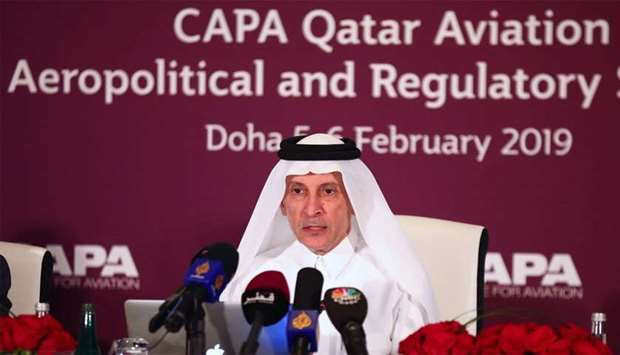Qatar Airways group chief executive HE Akbar al-Baker has welcomed the publication of ‘Doha Declaration,’ a manifesto that calls for a serious review of the existing aviation regulatory framework.
The Doha Declaration, which was announced at the conclusion of the CAPA Qatar Aviation, Aeropolitical and Regulatory Summit held in Doha, comes 75 years after the historic Chicago Convention, which established the International Civil Aviation Organisation (ICAO) as well as a set of global rules for airspace, air safety and air travel.
Commenting on the declaration, al-Baker said, “Qatar Airways wholeheartedly endorses the Doha Declaration and calls on airlines all over the world to join us in supporting it”.
The declaration follows the recent announcement that Qatar and the European Union have concluded their negotiations for a landmark Comprehensive Air Transport Agreement.
Al-Baker said, “Earlier this week, Qatar Airways was proud to celebrate the milestone of becoming the first country in the Gulf region to achieve a Comprehensive Air Transport Agreement with the European Union. This agreement, allied to the Doha Declaration, shows the world that we are committed to building trust among nations, overcoming the fear of competition and embracing the benefits of liberalisation in the aviation field.”
Speaking at the conclusion of the CAPA conference, the first of its kind to be held in the Middle East, Henrik Hololei, director general (Mobility and Transport) at the European Commission commented on the Doha Declaration, saying: “It is a good conclusion of the one-and-a-half days we have spent here.”
Doha Declaration: 75 years after the aviation regulatory framework was established, it is time for a serious global review of its relevance today; the “business of freedom” underpins 10% of global GDP. It is too important to be constrained by economic regulation that was designed to meet entirely different conditions
Doha Declaration recommends that governments should relax restrictive airline ownership and control rules, which underpin the bilateral air services system, constraining rationalisation of market access; increase efforts to encourage plurilateral liberalisation, for example as promoted by the European Union; enhance sustainability – in its broadest meaning – in the aviation sector; and actively encourage aero-political discussion and further engagement at the highest levels.

